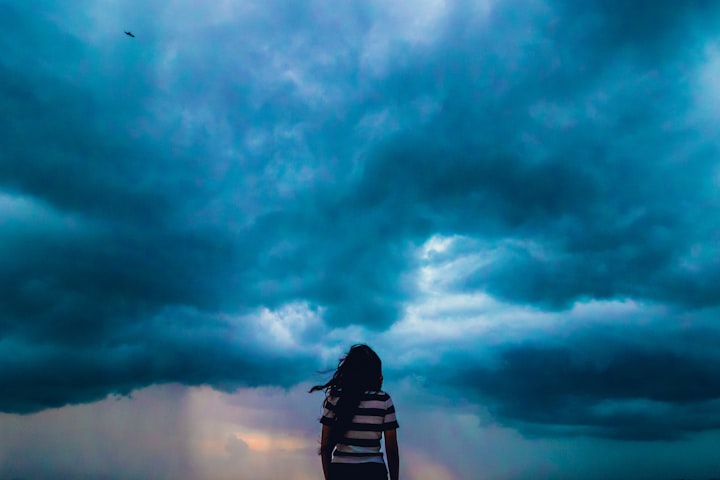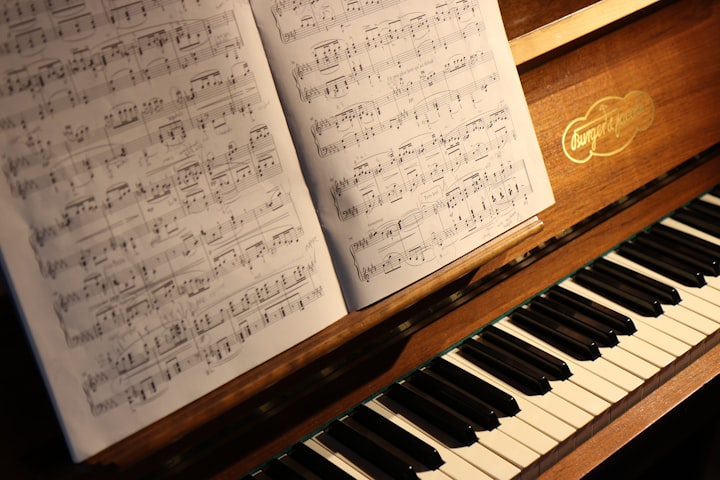A Songwriter Painted Me With Rain
"Someday, the thunder in her magic will find you and I won’t need say a word."

If walls could talk, I’d quote over 60 songs and their variations to you. These songs were written by a 14-year-old songwriter who begged her mom to make my pale faces a rich, dark purple. After that, jagged handwriting on scattered notebooks became melodies of despair and vengeance. They were inspired by words she wouldn't speak when she was away from me. Watching her work wasn’t like watching an angsty teen take their life for granted; she was a magician. The raw power from rants and tears became a string of notes that weren’t restrained by technicalities. The piano would roar between the scratches of lead carving into paper. Her own roars harmonized imagination and reality. Eventually, my company became her creative haven for songwriting and other ventures, all of which received harsh criticism too often.

More songs were written when the songwriter reached 18. She said the purple on my faces weren’t dark enough, and she was reminded repeatedly that she didn’t have a say in the matter. She didn’t own any of my faces and if that bothered her, she’d have to get her own place. That sounded great in theory; the freedom to paint the walls whatever color she wanted and hanging décor that was beautiful to her yet terrifying to others. All it took was a few Google searches and the doom and gloom of the real estate market to humble her quickly. Saving money became more important than dreaming, but saving money was an illusion in itself. A paycheck-to-paycheck life was normal, a bad kind of normal that reminded her of the 14-year-old who sang with rage. Although college was on the horizon and law school was the endgame, her magician’s instinct kept entertaining the idea of music becoming prosperity.
There was a dry spell of lyrics and melodies when the trek through arduous semesters stole her energy. When the songwriter was thrust into graduate school at 24, she was hit with an epiphany; a vision where the world of academia sharpened her creativity, then paved the way for her to train in the melodic magical arts and manifest a fortune. The graduate degree was online, which made the living expenses from the remaining balance of her loans taunting enough to finally capture her own place. Then, she was gone. I accepted that seeing her magic again wasn’t likely, but then she returned after two years. I barely recognized her.

Maybe it was premature to say the songwriter’s rage, despair, and agony was effortless magic. On good days, the magic ended up on notebooks and sheet music. On bad days, the magic cut into her skin and attacked her from the inside out. She’d end up paralyzed in her bed, dreading the light of morning. She’d burn hours of the day playing video games and ate her feelings as they ate away at her. The worst part was watching the magic-turned-curse persuade her to belittle the songs she shared with the world and hid them away from potential audiences. Her music, whether they were cover songs or her original songs, both of them taking every ounce of her bravery to produce and share, were slayed by an unreasonable amount of shame. After many episodes of self-destruction, she’d glare at me…I hoped to catch a glint of the fire that 14-year-old had, but this 26-year-old was volatile towards herself and towards me. I was no longer a creative haven. I was the warden and the prison, but in reality, I was a mirror.
At 29, the songwriter caught her reflection in the darkness painted on me. She remembered why the 14-year-old wanted the walls to be so dark. Sure, a part of it was for the gloomy aesthetic many artists prefer, but truly, the darkness was for hiding. The darkness was closed off from the world; a safe place for her expression. I watched her songwriting in the dark and called it magic. If I could talk, I would’ve tried to remind her of her power, but I’m so glad I couldn’t speak. The moment she would’ve heard my voice, she’d run. Back then she wanted more solitude than the dead. At 29, she was haunted by the company of 15 years of hiding and that forced her to ask herself if solitude was really her color.
The embarrassment from failing to own her own place and having no choice but to return to her hometown finally faded. The songwriter leaned more into her reflection in the dark and it reintroduced her to her magic. Her magic had changed since then. It cursed her from the inside more often than spill on paper. So, she examined the curse to the finest detail and it led her through the worst memories and the most destructive core beliefs. She slowly learned how to understand this curse without bias. Her harsh self-criticism could have been called a reflex in her past, but she transformed her self-critical nature into understanding. That’s when I saw the magic again through the revision of many songs. She didn’t change the emotion behind them, but she knew there were words better suited to validate her pain. The 14-year-old was allowed to roar. The 18-year-old had the right to dream. The 24-year-old embraced her ambition. The 26-year-old had permission to mourn.

Her magic evolved within and beyond her control. It transformed in and out of solitude for better and for worse. Regardless of its form, it created. The magic bled even when her piano was untouched for months, when notebooks were left on the floor for so long they left prominent indents into the carpet, or when she’d forget she didn’t need to be silent in the one place she could express herself freely. I know I was a distant observer who missed the context behind her ferocious tunes more often than not. I missed a whole two years of her life, but if walls could talk, I’d quote over 60 songs and their variations, discuss their meanings, and explore why some lyrics changed and others were left untouched. But once again, I’m glad I couldn’t speak. If I had, I may have ruined the moment she discovered what color suited her–Well, suited us.
Since I’m able to speak at the moment, I will discuss one of my favorites songs. When the songwriter was 16, she wrote, “She Loves The Rain”. It’s about her love for the ambience of storms, how it gave her peace when the noise of reality was too much, but the silence of solitude was too suffocating. She was serene as she gazed at gray skies crying on her skin. She was alive when monstrous clouds taunted destruction with thunder and crashing light. The rain, like her, found relief when tears fell gently or with rage and that relief was what came with the creation of over 60 songs.

At a young age, she knew she deserved to be heard, yet asked herself constantly, “Can I really make that happen?” At 29, the songwriter heard that question echo from past to present, which led to the ethereal tune born from her love for the rain. This gave her a vision of a color: a cool blue-gray; the color of a passing storm that caught the blue of a clearing sky and held the gray we often paired with melancholy. At 30, the songwriter painted me with rain, and if walls could talk, I’d recommend her work, but we’ll have to be patient for now. She’s found the calm in her storm and wants to cherish it. Someday, the thunder in her magic will find you and I won’t need say a word.






Comments
There are no comments for this story
Be the first to respond and start the conversation.